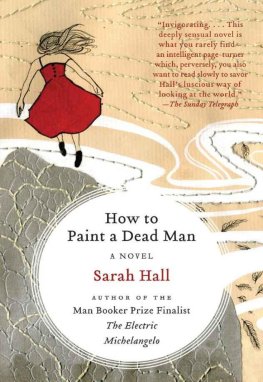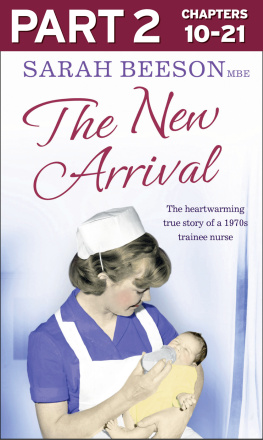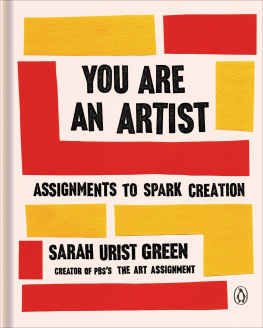Sarah Hall - How to Paint a Dead Man
Here you can read online Sarah Hall - How to Paint a Dead Man full text of the book (entire story) in english for free. Download pdf and epub, get meaning, cover and reviews about this ebook. year: 2009, publisher: Harper Perennial, genre: Prose. Description of the work, (preface) as well as reviews are available. Best literature library LitArk.com created for fans of good reading and offers a wide selection of genres:
Romance novel
Science fiction
Adventure
Detective
Science
History
Home and family
Prose
Art
Politics
Computer
Non-fiction
Religion
Business
Children
Humor
Choose a favorite category and find really read worthwhile books. Enjoy immersion in the world of imagination, feel the emotions of the characters or learn something new for yourself, make an fascinating discovery.
- Book:How to Paint a Dead Man
- Author:
- Publisher:Harper Perennial
- Genre:
- Year:2009
- Rating:3 / 5
- Favourites:Add to favourites
- Your mark:
- 60
- 1
- 2
- 3
- 4
- 5
How to Paint a Dead Man: summary, description and annotation
We offer to read an annotation, description, summary or preface (depends on what the author of the book "How to Paint a Dead Man" wrote himself). If you haven't found the necessary information about the book — write in the comments, we will try to find it.
How to Paint a Dead Man — read online for free the complete book (whole text) full work
Below is the text of the book, divided by pages. System saving the place of the last page read, allows you to conveniently read the book "How to Paint a Dead Man" online for free, without having to search again every time where you left off. Put a bookmark, and you can go to the page where you finished reading at any time.
Font size:
Interval:
Bookmark:
Sarah Hall
How to Paint a Dead Man
For Jake
Things are not what they are, they are what they become.
GASTON BACHELARDThe Mirror Crisis
You arent feeling like yourself. You havent been feeling like yourself for a while now, not since the accident. More accurately, not since the moment you heard about it. That morning, that minute, holding the phone to your ear and hearing your father say those horrific words; it was then you felt the change, then when you were knocked out of kilter. Youre not sure whats wrong exactly; its hard to put your finger on, hard to articulate. It isnt grief. Grief would be simple. Something internal, something integral, has shifted. You feel lost from yourself. No. Absent. You feel absent. Its like looking into a mirror and seeing no familiar reflection, no one you recognise hosted within the glass.
Youre not crazy. You must emphasise this point and remind yourself of it. You are not crazy. And youre not being coy, or difficult. This isnt about fashionable social detachment, the current trend for woe-is-me, or wanting to be the cool detached outsider. You cant quite catch sight of yourself as you go about your life, thats all. Your body doesnt contain its spirit, just as the mirror has relinquished your portrait. You are elsewhere.
You used to feel something similar as a child, but it was less empty, less lonely then. Your brother was the same. The pair of you had a peculiar sense of each other, not as separate people but as doppelgngers, symmetries, which is quite common in twins of course. You werent formed from a separated egg-you werent identical, not a common gender, John and Jack, or Ruth and Rita. Still, there you were, together, from the very beginning. You linked fingers in the womb. You shared a pillow of placenta, pedalled in tandem against your mothers belly. You heard concurrently the wet chamber music of her body, shared nutrients, and dreamt the same hermetic dream. After you were born, pink then blue, you then Danny, your existences were still pegged closely together, like your newborn hats on the washing line.
Later, it was as if you were sitting with him on the sofa, at his exact coordinates, when really you were sitting opposite him at the table, making potato prints with your mum. Sometimes you felt you were more at his location than you were at yours. Ulterior proximity, its called. When you waved it wasnt to your brother, it was to yourself. Nobody ever worked that out, not even your mum, who said, Wave to Danny again, sweetheart, hes waving back. You were placed in separate cribs, but the heat of him still kept you warm at night. He still tugged the blanket away from your cheek when he tucked it up under his own. At least, thats how it felt.
Inevitably, you learned to talk. This is when things got tricky. You developed a method of speaking on behalf of the displaced you. It was logical, in a way. At first they thought you were speaking on behalf of your brother, as bossy, older siblings often do. You want juice please, you said, and they gave it to Danny in his chewed sippy-mug. And would you like some juice too, Suzie-Sue, they crooned. Such an adorable bond, people said. So unusual. There were lots of baby photographs taken with you looking quizzical, frowning at items around the room or at the adults posing with you. Your brother was quiet, quieter than you, and always smiling, as if he knew a secret.
The situation became worrying. Playgroup was a minefield. Nobody could really tell who you were talking about: yourself or Danny. The subjects of your speech were often confused, and you and your brother babbled privately together, making up names for spiders, stomach aches, and rain. You did not make friends with the other children at first; instead the two of you played hoops and balls together and swapped beakers of milk; there was a system of cup colours to be observed. There was talk of educational retardation, developmental limitation, which shocked your mum and dad. There were visits from the healthcare worker, District Nurse Lane. You remember her rigid triangle skirt and her bleached cuticles. She wondered about this inseparability, this double-speak. She wondered if, rather than being delightful, it was abnormal to possess a psychological satellite. She wondered how healthy the relationship really was between Danny and you.
Enter Dr Dixon, at the paediatric clinic in town. Because you seemed to be the one in charge, because the sibling unity was too powerful, you were going to have special lessons with him, to help you be more comfortable. The building had a brass bell, and an old wooden revolving door wheelchairs couldnt fit through: the first time you went you watched a girl with callipered legs being lifted up and carried through. It looked as if she were being fed into a giant grinder, and when it was your turn you had to be cajoled and encouraged into the blades. The carpet inside was made of tiny blue plastic threads. After youd walked across it there was enough static to make a little jolt of electricity crack from your fingertip when you touched the table. There were anti-smoking posters with cloud-skulls floating above people holding cigarettes. Dr Dixon kept a tank of stick insects in his reception for the kids to look at. Sometimes they shed, leaving their skins behind on the aquarium trees where they dried and curled like thin spun toffee. It made you feel queasy to see the brown husks hanging off the forks of bark.
The doctor smelled of pencil shavings and peppermints. He spoke very slowly, very deliberately. His teeth looked white and strong. For a while you thought he was a dentist, but he never asked you to open wide. Instead he held you gently by the shoulders and asked impossible questions. What do you think is the best way to answer this question, Sue? If I took away your mother and father, and then I took away your brother Danny, what would you be called? The last proposition always made you furious, and you scowled yourself into a headache. He asked you to paint pictures of your family. Who do you see here, here and here? You were encouraged to play by yourself each day, without Dan, without dolls, or books. It seemed particularly unkind to your brother, who looked crestfallen whenever your mum said it was time for you to go upstairs for special hour. Only once did Danny come to the clinic. The two of you were put in an observation room and left alone. You endured six months of Dr Dixon. It felt like years. Then the whole thing was over. Only later, when you were a teenager and you asked about those memories, was it described, apologetically, as treatment. Now you cant pass by the old sandstone clinic at the top end of your hometown without hearing that mans relentless nasal parroting. Say I do, Sue, say I do, Sue.
But it worked, you suppose. You learned to communicate normally, like the rest of the psychically circumscribed automatons of the world. You looked at yourself in the mirror Dr Dixon gave you to hold. You repeated the words until they stuck. Me, me, me. I, I, I. You wound back into yourself, like the reversing spool on your mums sewing machine. You became a separate unit. You were cured.
Now here you are again, dislocated, remote, spilling your essence out into the void.
Youve been thinking about this. Youve been wondering if you are really so different from everyone else in the massive, grinding city where you live. You look at the variety of faces opposite you on the bus; listen to the conversations. Everyone seems to be in crisis. You just want to get out of the financial mess, a man in a grey suit says to his black-suited colleague. An oily teenager yells into his mobile phone: You cant help feeling like a bastard for wanting her to get rid of the thing. She was the one who forgot to take the fucking pill!
Font size:
Interval:
Bookmark:
Similar books «How to Paint a Dead Man»
Look at similar books to How to Paint a Dead Man. We have selected literature similar in name and meaning in the hope of providing readers with more options to find new, interesting, not yet read works.
Discussion, reviews of the book How to Paint a Dead Man and just readers' own opinions. Leave your comments, write what you think about the work, its meaning or the main characters. Specify what exactly you liked and what you didn't like, and why you think so.













